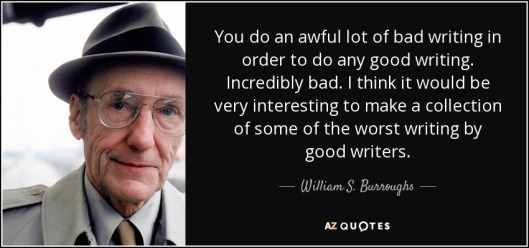Tags
authortoolboxbloghop, brandon sanderson, David Eddings, first drafts, Guy Gavriel Kay, Jim Butcher, Neil Gaiman, Terry Pratchett, tips, tricks, write every day, writing

This post is part of the #AuthorToolboxBlogHop, which I’m thrilled to be participating in, and which I totally forgot to actually mention last month. Whoops! Check out the main link for lots of other fantastic authors with lots of other fantastic advice.
We talk a lot as writers about “finding your voice”, telling your story the way only you can tell it. Some authors (like Elmore Leonard, in an article that my podcast discussed some weeks back) think that a writer should keep their voice as far back from the story as they can, and let the reader and the story have their adventure without interference.
On the other hand, there are any number of authors whose success comes in large part because of the strength of their writing voices. Neil Gaiman, Terry Pratchett, Jim Butcher, and Peter S. Beagle all come immediately to mind. My personal list also includes David Eddings and Guy Gavriel Kay, both of whom wrote stories that I don’t think would have engaged me if someone else had tried to tell exactly the same tale in a different voice.
This blog post has nothing to do with that.
This blog post has to do with another thing that writers talk about: that the first draft of every great novel was crap; that bad writing is the inevitable first step on the way to good writing. There’s a quote I like that’s attributed to Janet Hulstrand: “Bad writing precedes good writing. This is an infallible rule, so don’t waste time trying to avoid bad writing. (That just slows down the process.) Anything committed to paper can be changed. The idea is to start, and then go from there.”

I would totally buy this collection if someone published it.
That’s a great idea, in theory! The problem for a lot of new writers (and maybe some more accomplished ones too) is that we don’t actually know how. It seems like it should be easy to just sit down and start writing things, cringe here and there and just keep plowing through. It sounds a lot like how a lot of us approached high school essays, and those were simple enough.
And yet, I know I’m not the only one who’s found herself sitting at a word processor, staring at the cursor as it refuses to move. I’ve got the ideas, I’ve got my fingers on the keys, and I’m stuck.
A slight tangent here; I know I have a writing voice. Those of you who’ve read more than one blog post have probably already started to notice that. For all that I’m a flailing nut in real life, once I start putting words on paper I get quite … serious? Cerebral? I’m probably not the best person to do this kind of analysis, but the point is that writing for me is a fairly serious process, and writing fiction is no different. It’s not the sort of thing I come into casually; every word has a purpose, even if it later turns out to have been the wrong purpose.
That holds true for me whether it’s an email, an IM to a friend, a cover letter, a blog post, a final proof or – and here we get back to the point – the first draft of a novel I don’t even understand yet. It doesn’t matter that my brain’s doing the right thing, throwing out ideas to see which ones stick. By the time my hands and vocabulary are done with it, the light-hearted experiment has become a thoughtful, weighty endeavor whether I wanted it to or not.
No wonder it’s hard to get writing done sometimes!
The thing is, everything you do as a writer should ultimately work to your advantage: to make your story better, to save you time, to hook readers, to make connections. Having a clear, distinctive, engaging voice is a good thing if it draws people to your work and makes them want to read you instead of the next author on the table beside you. But nobody’s reading your first draft except you, and maybe your closest alpha readers, and they already know what you’re going to sound like when you’re all polished up.
Sounding like yourself in your first draft isn’t actually a virtue in and of itself. It’s not a problem if it helps you write better, faster, or helps your ideas flow more cleanly. But if you’re having trouble getting first drafts to come out, I invite you to join me in an experiment that I’ve been working on for the last few months: developing a drafting voice.
In the same way that I’ve had to teach myself not to go back and immediately edit a word because it doesn’t look right, I’m now trying to train myself to use whatever voice will let me get the next sentence out, even if it makes me want to cringe and hide in a hole.
For example:
James scowled. “Dryad?” Tree-huggers, but stubborn. Strong blood, not inclined to bend to anybody’s wills by their own, and the last three – the last three – he’d met had gotten it into their heads that he was too serious, had decided that it was their job to fix that little flaw. He couldn’t imagine any of them having any interest in Jeremy Dalton, with his darting eyes and his scent of fear.
The captain shrugged.
“I don’t think we can say based off of a couple of comments about a tree, but yeah. We couldn’t find out much more without being obvious about the questions. Right now, he thinks Thatcher’s just going to ignore the part of the interview where he started wondering whether or not there was something extra-special about his wife. Ix-nay on the agic-may.”
There’s a tone going on here, very cerebral and analytical, stuck in James’ head. If I want to keep the scene moving but I feel like I can’t quite match that mood, that normally locks me up for days. Once I’m locked on a scene, the fear can make it harder to break through again, until the entire thing feels impossible.
So I forced myself to go on anyway:
“Max is good at that,” James says. He doesn’t like having to give compliments, but Max is good with people. Otherwise, James would have probably fired him. “So, is this where I come in?”
Normally, I’d rather die than write in the present tense. I really, really don’t like it. I will never publish a book in the present tense. I would really like to just be able to set it on fire. But you know what? It got the scene moving again, and a couple of weeks later I was able to go back and modify it again:
“Max is good at that,” James admitted grudgingly. The man might not have been the brightest officer around, and he had an annoying tendency to make friends with every lost lamb that came his way, but he had a way with people that got them to open up to him. Often without even knowing what they were doing.
Useful trick, and maybe the only reason he even vaguely tolerated being around the man.
“So, is this where I come in?”
Which, honestly, I still think is horrible, but it’s only a second draft, so that’s fine.
My situations aren’t normally that extreme. I usually just end up having to loosen my language a little bit, step away from my characters for a few sentences. Sometimes I’ll pretend that I’m describing a scene to a friend rather than writing it or I’ll summarize instead of going sentence-by-sentence. Whatever it takes to make it through a slow spot.
The point is, first drafts are about doing whatever you have to do to make get the story going. That means bad writing. It means bad ideas. It means sounding awkward, and sounding like you never want to sound. It means figuring out what’s working against you, and fighting with it until it’s on your side.
Don’t be afraid of sounding like an idiot. First drafts aren’t about looking good, they’re about having something to turn into second drafts.
Good luck!


Great ending advice!
LikeLiked by 1 person
I got there eventually 🙂 I’m glad you appreciated it!
LikeLiked by 1 person
Hi! I hate first drafts! It’s soooo painful and my drafting voice is terrible 🙂 It makes me cringe. Maybe this is why I love editing so much
Leslie
LikeLiked by 1 person
Hooray, another fan of editing!! it’s where all the good stuff happens anyway. 😛
LikeLiked by 1 person
Love the Janet Hulstrand quote. I’d like to read the first draft of Harry Potter. Think she’d share it? I bet she’d share a few paragraphs if someone asked and she actually saw the request. That’s interesting advice, and I’m going to remember it the next time I’m stuck. Push through in whatever voice will get me to the next section. Thanks Katherine! And this month, I forgot to mention the blog hop, and had to go in five minutes after I published it and add the link. And I’m the host! I’m setting a terrible example, haha.
LikeLiked by 1 person
If enough people were able to convince her that they were genuine, you know, she actually might! Assuming she still has it. I heard she drafted on napkins and things, the way none of us actually do anymore.
I hope you find it helpful!!
LikeLike
Some interesting thoughts here. I particularly like the notion using whatever voice works in order to just get the words out. As someone who frequently suffers from analysis-paralysis, this could be worth a try. Thanks
LikeLike
Great advice, thanks for sharing 🙂
It’s strange: When I’m writing emails, IM’s and blog posts I obsess about making every word perfect. When I write first drafts though, it’s like someone just threw up on the paper. I’ve learned to turn my inner editor off, write whatever comes to mind, and sort it later. The way I see it, I’m the only person who will see the first draft, so it doesn’t matter how terrible it is 🙂
LikeLike
You’re so right about first drafts, they never need to see the light of day so there’s no point in worrying that they look and sound awful. Just use them as a foundation to create a sparkling second or third draft! 🙂
LikeLike
This is non-intuitive advice, and I look forward to trying it out soon. For me, when I get stuck, I put the scene aside and start writing another one. It seems like having a stronger than usual idea of where the scene needs to go in order to synch up with a later scene helps me get past the wall I’ve encountered. But, I wonder if my usual coping method closes off some scene development opportunities.
LikeLike
Very good point! I may need to start searching for my drafting voice! 😀
LikeLiked by 1 person
Drafts are tough — I’ve taken such different stances, POV, events, you name it with my current WIP, learn from every draft, and keep on moving. Thanks for sharing this…
LikeLiked by 1 person
Great post, I am presently battling the present tense! Worse still, first person, present tense.
LikeLiked by 1 person
I actually have a secret love of first person present tense! 😀 It’s so vivid!
LikeLike
Hi Katherine, I’ve just posted my bit on this subject, thanks for the inspiration!
LikeLike